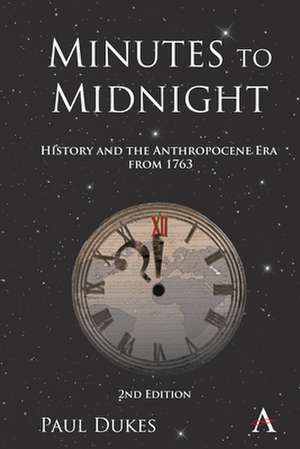Minutes to Midnight, 2nd Edition
Autor Paul Dukesen Limba Engleză Paperback – 29 oct 2020
In 1947, the Doomsday Clock was created by a group of atomic scientists to symbolise the perils facing humanity from nuclear weapons. In 2007, it was set five minutes before the final bell, including for the first time the threat of climate change as well as new developments in the life sciences and nanotechnology. This book aims at an analysis of the evolution of our present predicament throughout the Anthropocene Era beginning in 1763, making special reference to the history of the period, the study of the subject and major advances in the natural sciences.
Adam Smith and Adam Ferguson set out the basis for a scientific approach to the pre-industrial stages of historical development in the Enlightenment of the late eighteenth century, when the American and French revolutions created a vocabulary of modernity. Throughout the nineteenth and twentieth centuries, as the industrial revolution unfolded in several stages, nationalism, imperialism and totalitarianism were among the phenomena impeding the update of the Enlightenment programme as well as the fulfilment of the aspirations of 1776 and 1789. Our present predicament demands a rigorous examination of its origins and an assertion of a scientific pandisciplinary approach involving history and other academic specialisations.
Preț: 150.27 lei
Nou
28.76€ • 31.23$ • 24.16£
Carte disponibilă
Livrare economică 01-15 aprilie
Specificații
ISBN-10: 1785274988
Pagini: 250
Dimensiuni: 140 x 216 x 26 mm
Greutate: 0.27 kg
Editura: Anthem Press
Notă biografică
Born in Wallington, Surrey in 1934, Paul Dukes has history degrees from Cambridge, 1954, Washington, 1956 and London, 1964. He has been associated with Aberdeen University since 1964, with visiting appointments at Auckland and Cornell. He is the author of a wide range of publications on Russian, European and world histories.
